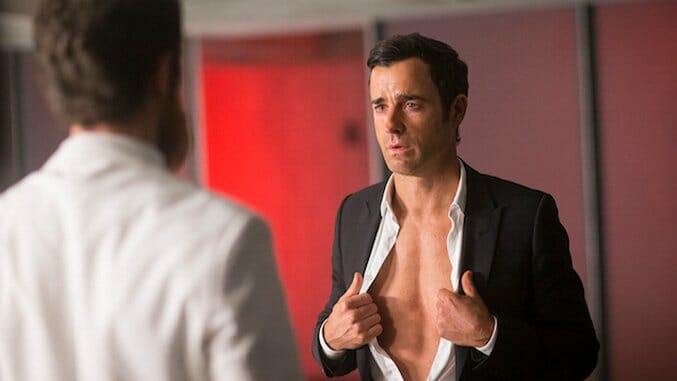How The Leftovers Learned to Stop Worrying and Love the Bomb
(Episode 3.07)
Ben King/HBO
To hear Vice President Meg Abbott (Liv Tyler) describe it, the “ethical deterrent” known as the Fisher Protocol resembles the question Drs. Eden and Bekker pose to Nora in “G’Day Melbourne.” In order to annihilate the human race, Kevin (Justin Theroux) must annihilate himself, or a version thereof; the key to the nuclear football is buried behind his lookalike’s heart, and its removal is sure to be murder. If the earlier episode frames Nora’s choice in different terms, pitting the death of a child against the cure for cancer, both scenarios confront the characters with the same calculation: Does one life weigh more or less than the others combined, and how might one go about measuring? Each case, of course, is a thought experiment—no one dies, at least not yet—but the theme’s repetition in “The Most Powerful Man in the World (and His Identical Twin Brother)” seems as significant now as the presentiments of disaster in “The Garveys at Their Best.” Repurposing the cold, aloof, knowing invention of “International Assassin” to set the table for the series’ end, tonight’s episode emerges, finally, as a poignant treatment of regret.
It’s also raucously funny, a clear through line in The Leftovers’ final season: The code Meg offers to Kevin in the episode’s action-adventure netherworld is 6969 (nice), and he accesses the bunker where he meets Secretary of Defense Patti Levin (Ann Dowd) by offering his dick print (a winking reference, I suspect, to Season One’s gray sweatpants). This almost farcical aspect distinguishes “The Most Powerful Man in the World” from the more solemn “International Assassin”—a canny decision, since the setting itself no longer enjoys the element of surprise—even before Kevin slips underwater; his conversation with Nora (Carrie Coon), when Lily was still in their care, comprises cremation, taxidermy, and her playful suggestion that he should grow a beard. From the destruction of Patti’s glasses to the insults she lobs at Meg (“I couldn’t enlighten you with a fuckin’ thousand-watt bulb,” she snarls), the episode bristles with black humor, as if it were the gag one cracks in the midst of mourning to keep oneself from crying.
After the shattering conclusion of “Certified,” this counts as a respite, though “The Most Powerful Man in the World” is as consumed as Laurie is by the onrush of the past. As in “The Garveys at Their Best,” which pores over the eve of the Sudden Departure for clues as to what was coming, The Leftovers’ penultimate hour sifts through three seasons of loss in search of closure, only to reaffirm that the end of grief depends not on the dead, but on those of us who survive. Its allusions to the series’ annals are legion—the first season’s fearful theme accompanies the opening credits; a teleprompter refers to the title of “G’Day Melbourne”; the voice in Kevin’s earpiece is both the man of the karaoke bar in “International Assassin” and Matt Jamison’s stand-in for “God”—but “The Most Powerful Man in the World” is, first and foremost, a Book of the Dead: Dean (Michael Gaston), Evie (Jasmin Savoy Brown), Meg, Patti, Christopher Sunday (David Gulpilil), Kevin Yarborough (David Garvey), Grace Playford’s kids—a crowded ledger of those, from “Cairo” to “Crazy Whitefella Thinking,” that the living were unable to save.
-

-

-

-

-

-

-

-

-

-

-

-

-

-

-

-

-

-

-

-

-

-

-

-

-

-

-

-

-

-

-

-

-

-

-

-

-

-

-

-








































